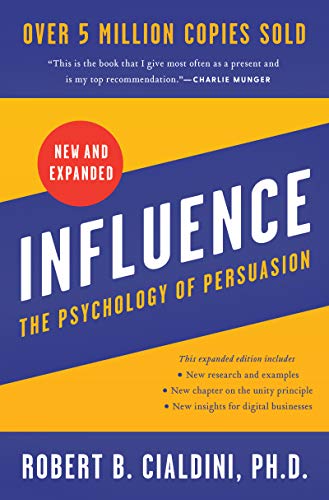
Influence, New and Expanded: The Psychology of Persuasion

The second important thing to understand is that we, too, have our preset programs, and although they usually work to our advantage, the trigger features that activate them can dupe us into running the right programs at the wrong times.
Robert B. Cialdini • Influence, New and Expanded: The Psychology of Persuasion
.psychology
The customers, mostly well-to-do vacationers with little knowledge of turquoise, were using a simplifying principle—a stereotype—to guide their buying: expensive = good. Research shows that people who are unsure of an item’s quality often use this stereotype. Thus the vacationers, who wanted “good” jewelry, saw the turquoise pieces as decidedly
... See moreRobert B. Cialdini • Influence, New and Expanded: The Psychology of Persuasion
.psychology
The principles—reciprocation, liking, social proof, authority, scarcity, commitment and consistency, and unity—are discussed both in terms of their function in society and in terms of how their enormous force can be commissioned by a compliance professional who deftly incorporates them into requests for purchases, donations, concessions, votes, or
... See moreRobert B. Cialdini • Influence, New and Expanded: The Psychology of Persuasion
.implementation .modelthinking
even though both hands are in the same bucket, the hand that was in the cold water feels as if it is in hot water, while the one that was in the hot water feels as if it is in cold water.
Robert B. Cialdini • Influence, New and Expanded: The Psychology of Persuasion
.psychology
There is a principle in human perception, the contrast principle, which affects the way we see the difference between two things that are presented one after another. If the second item is fairly different from the first, we tend to see it as being more different than it actually is. So if we lift a light object first and then lift a heavy object,
... See moreRobert B. Cialdini • Influence, New and Expanded: The Psychology of Persuasion
This book presents numerous research results that at first appear baffling but can be explained through an understanding of natural human tendencies. A while ago, I encountered such a finding when I read a study that gave volunteers an energy drink designed to increase mental abilities. Some volunteers were charged the retail price of the drink
... See moreRobert B. Cialdini • Influence, New and Expanded: The Psychology of Persuasion
Sometimes the issues may be so complicated, the time so tight, the distractions so intrusive, the emotional arousal so strong, or the mental fatigue so deep that we are in no cognitive condition to operate mindfully. Important topic or not, we have to take the shortcut. Perhaps nowhere is this last point driven home more dramatically than in the
... See moreRobert B. Cialdini • Influence, New and Expanded: The Psychology of Persuasion
Not only was the family of the college student made to feel indebted by the help he received, but had they been able, they could have retired the debt, as research indicates, by helping a member of the nurse’s family (Goldstein et al., 2007). Additional research shows that this kind of group-based reciprocity extends to mistreatment. If we are
... See moreRobert B. Cialdini • Influence, New and Expanded: The Psychology of Persuasion
A well-known principle of human behavior says that when we ask someone to do us a favor, we will be more successful if we provide a reason. People simply like to have reasons for what they do.